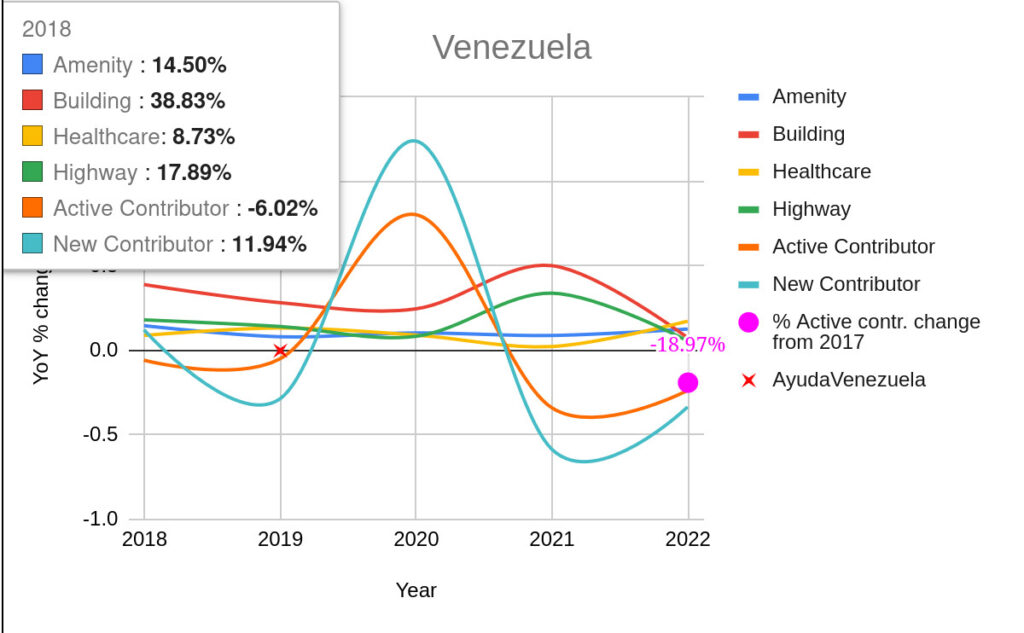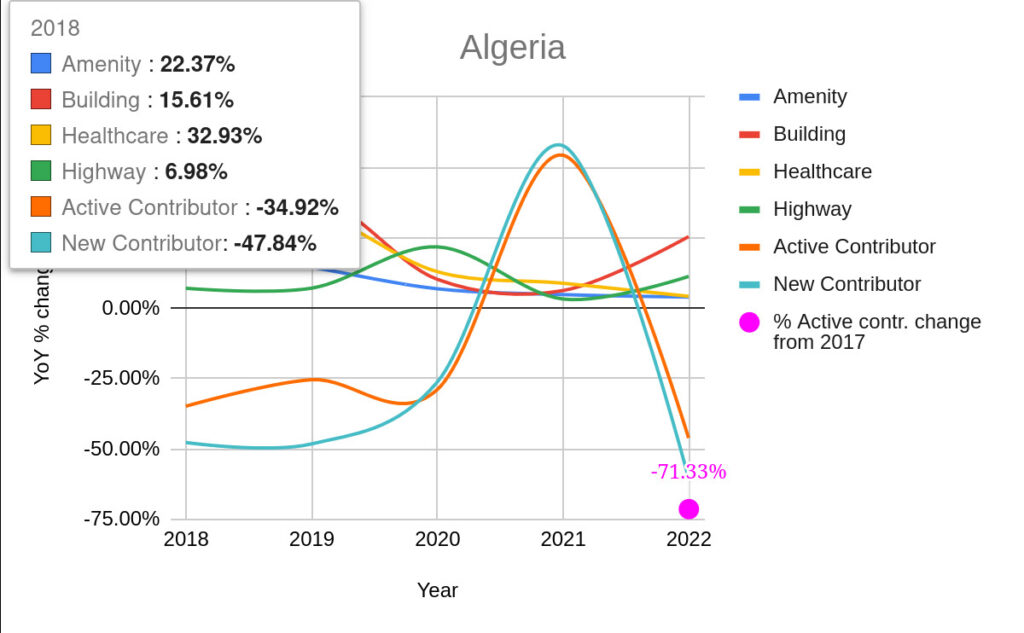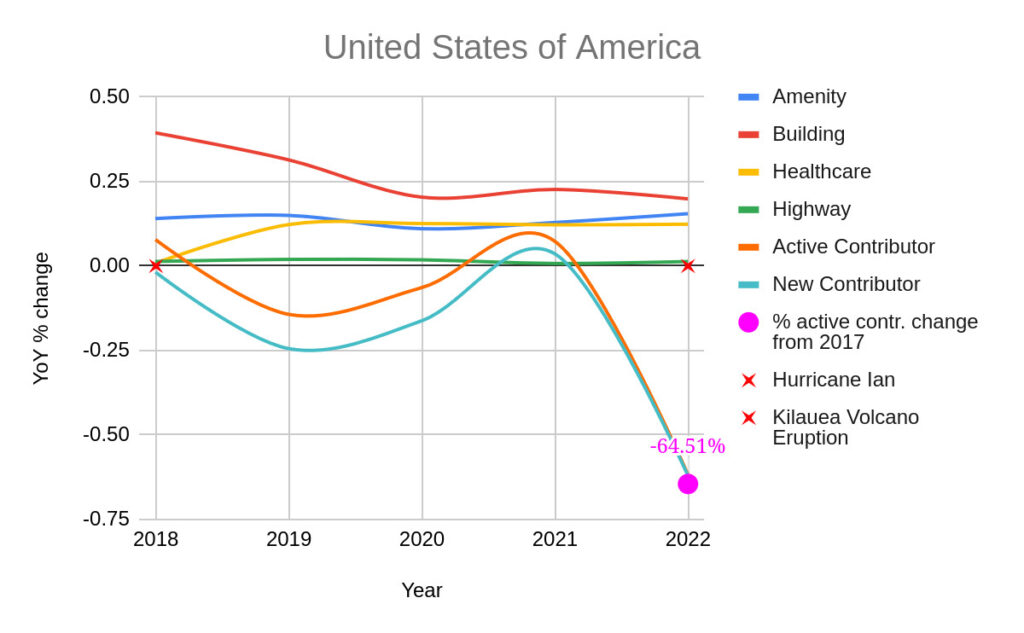This is a cross-post from my OSM diary.
As Community Strategist and Research Lead at HOT, I would like to take a closer look with you all at the evolving landscape of OpenStreetMap (OSM) contributors, especially in the context of local knowledge and its crucial role in our mapping efforts.
Summary
Our study reveals a trend in local knowledge contributions in OpenStreetMap: a small but dedicated number of local mappers, making up just about 3% of contributors who are in the area mapping, is responsible for approximately 75% of the detailed mapping contributions.
This significant finding underscores the vital role of local knowledge and expertise in creating comprehensive and accurate maps, especially in humanitarian and unmapped/under-mapped regions. Despite a general decline in new OSM contributors, the impact of this core group of local mappers remains profound and indispensable for the future of the project.
We would like to engage researchers and mapping communities to unveil what are the implications of these numbers and the opportunities to use them to better support mappers.
The Spark of Inquiry: Simon Poole’s Analysis
Our journey began with Simon Poole’s important observation: a 20% drop in new OSM contributors. This sparked intense discussions within our team and motivated us to investigate further, particularly focusing on regions where HOT is actively involved.
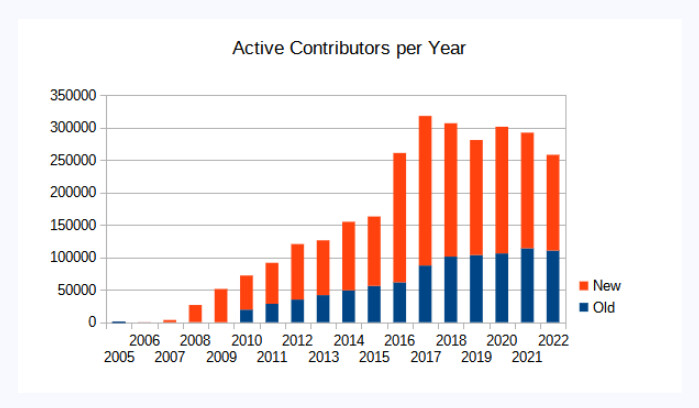
Our findings validated a consistent decline in the number of contributors in most of the 33 countries analyzed over the past five years. However, intriguingly, the volume of mapped elements, like buildings and roads, has been on the rise. This disconnect between contributor numbers and mapping activity led us to delve deeper into the nature of these contributions with deeper analysis.
Why Understanding Local Contributions in OSM Matters
Grasping the dynamics of local contributions to OpenStreetMap is more than just number crunching – it’s about ensuring that maps reflect the lived realities of communities worldwide.
In regions facing humanitarian crises or high poverty levels, local knowledge in mapping becomes invaluable. Accurate maps created with local insights can significantly aid in delivering effective aid and developing sustainable solutions. Our focus on this aspect underscores the need to nurture and support local mapping communities.
Pioneering Methodologies: Towards a Better Understanding
One of our main challenges was to distinguish between local and remote contributions. With the support of Caleb Fagunloye, our Data Analytics and Insights Intern, we developed a pilot methodology focusing on data contributions indicative of ground surveying or field mapping. This innovative approach, though not without its limitations, allowed us to isolate mapping contributions that are likely to come from local knowledge.
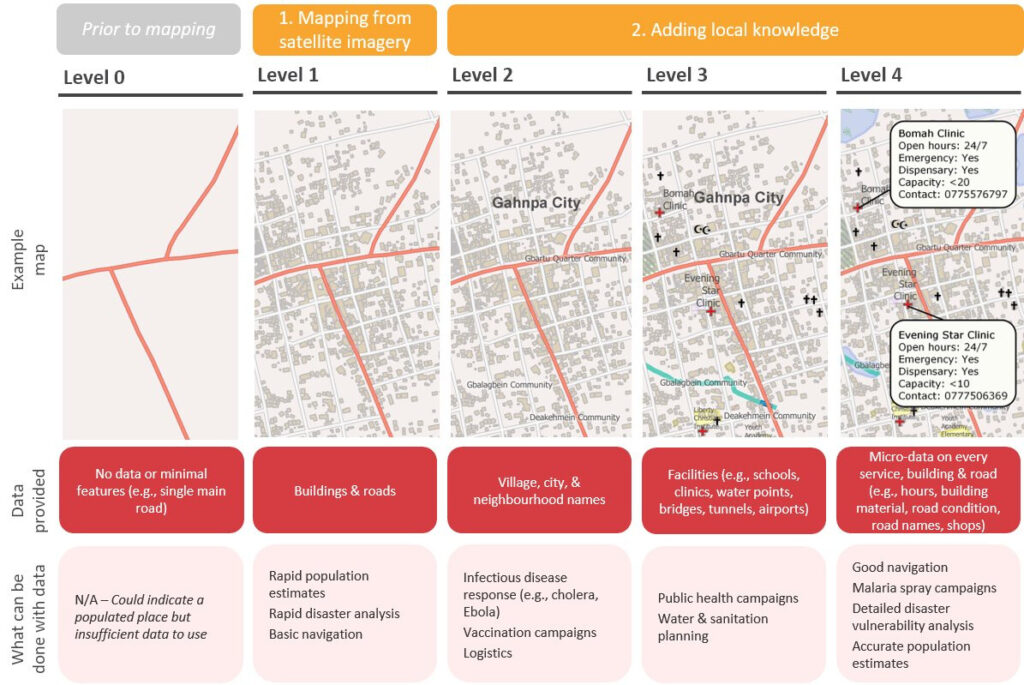
We took Rebecca Firth’s illustrative humanitarian mapping framework and isolated the contributions in levels 2-4, essentially excluding edits to the map that could be made using satellite imagery.

We then looked at the users (usernames) who made these changes to try and understand who was adding local knowledge to OSM in these countries in 2022.
Key Insights: The Role of Local Champions

Average: Percentage of contributors and changes they made
- Our analysis showed that a small proportion of contributors (~3%) were responsible for the majority of local knowledge changes (~75%). This highlights the significant impact of a few highly active local OSM champions.
- However, this also points to a potential vulnerability in terms of sustainability and depth of community engagement. What happens if these key contributors reduce their activity?
Here you can see a table with the full data for some countries we analyzed, note how just a few contributors are responsible for most of the changes:
| Country | Total changes to elements (2022) | # contributors who made these changes | % (#) of contributors responsible for 50% of the changes | % (#) of contributors responsible for 75% of the changes | % (#) of contributors responsible for 95% of the changes |
|---|---|---|---|---|---|
| Nepal | 50239 | 713 | 0,4% (3) | 1,8% (13) | 12% (86) |
| Senegal | 2338 | 172 | 1,7% (3) | 7% (12) | 43,6% (75) |
| Kenya | 7415 | 313 | 1% (3) | 2,6% (8) | 28% (87) |
| Mexico | 38556 | 1078 | 0,5% (5) | 2,6% (28) | 21,1% (227) |
Some of the numbers here were very surprising. For example, three people in Kenya, Senegal and Nepal were responsible for 50% of all the local knowledge changes to OSM in those countries in 2022.
Forward Path: Expanding Research and Engagement
- We welcome improvements to the methodology! The more solid it is, the better our understanding of the OSM community landscape will be.
- Our early research has opened avenues for more comprehensive analysis, especially focusing on the long tail contributions of casual mappers and social science / anthropological explorations
- We think we still need to understand this analysis in other locations and analyze the evolution and trends over time.
- HOT will keep the peer to peer support to individuals and communities to implement collective and collaborative actions, improve resources and skills and enable tech to empower and facilitate these local knowledge edits.
- We have also published a notebook with the code to replicate this user extraction and analysis, for the countries and years of your interest. It shouldn’t take more than 15-20 minutes to get some results.
Limitations
The pilot methodology above is far from perfect. For example, we know that it is possible to add ‘local knowledge’ data to the map remotely (MapRoulette campaigns and imports are two examples).
The tag list used for the analysis also has some known flaws, such as road names being excluded even though they are likely to indicate local knowledge.
It is also really important to say that a Kenyan or Mexican mapper who only does mapping using satellite imagery is still a very valid member of that community of contributors! Although we did this research because we believe in the value of local knowledge in the map, it is not a judgment on other mapping methods!
Also note that the analysis includes people who are mapping on their employee capacity for a corporation/organization, who tend to contribute in high volumes. Taking this into account for a follow-up study and finding ways to exclude them from the numbers, might provide a more realistic picture of paid and not-paid contributions.
Open questions from SoTM EU presentation
This analysis was presented by Pete Masters during the recent State of the Map Europe 2023 and some interesting discussion followed.
- The situation was familiar for members of more mature OSM communities. Those with now very active local knowledge contributors recognised that, in the past, a small number of very committed mappers did the majority of the field mapping and surveying.
- Could these ‘core mappers’ end up being gatekeepers and discourage newer mappers from developing their OSM contribution?
- Where should we allocate resources in supporting local knowledge contributors – new people to OSM, mappers who have shown inclination to add local knowledge or the core mapper group? Do efforts tend to focus on new mappers to the detriment of other groups?
- Why do mappers do what they do? One hypothesis is that people contributing high quantities of local knowledge data do so because they have a purpose for that data. Is this true? If not, what drives core mappers?
- How does this analysis look spatially? Does a core mapper in Nepal mean that their home town is very detailed with towns further away increasingly lacking in local knowledge?
- How does 2022 compare with 2023 or 2021? This is a snapshot, not a trend at the moment.
A Call to Action
Our journey doesn’t end here. We see this as a stepping stone towards a more extensive, nuanced analysis of OSM contributions. We invite community leaders, social scientists, and OSM enthusiasts to join us in this endeavor. Your insights and expertise are invaluable in shaping the future of open mapping.
- Join our #research chat room on Matrix or Slack.
- Collaborate and discuss research over the OSM Forums.
- Recreate this analysis using our code for your local country and publish the results to kickstart a local conversation or frame additional research.
- Moving forwards Pete Masters will be taking over this piece of work, feel free to reach out to him if you have questions, comments or want to collaborate with HOT.
